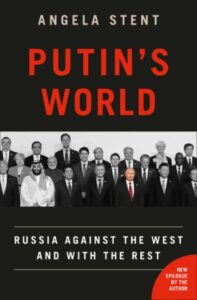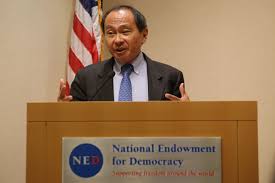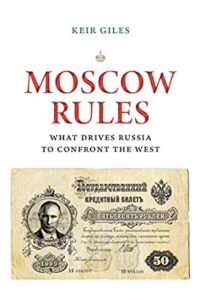Russian President Vladimir Putin’s entire attitude towards the democratic world changed following the Orange Revolution, says Taras Kuzio, a Research Fellow at the Henry Jackson Society in London and author of “Russian Nationalism and the Russian-Ukrainian War.” He blamed the West for fermenting and supporting Ukraine’s protest movement and came to view the revolution as a dress rehearsal for a similar uprising inside Russia itself.
Ever since the Orange Revolution, Putin has regarded the return of Ukraine to the Russian sphere of influence as his most important task. This is the “unfinished business” he must accomplish if he wishes to secure his legacy and enter the Russian history books as one of his country’s greatest rulers, he writes for The Atlantic Council.
 The core element of the Putin doctrine is getting the West to treat Russia as if it were the Soviet Union, a power to be respected and feared, with special rights in its neighborhood and a voice in every serious international matter, notes Angela Stent, a Nonresident Senior Fellow at the Brookings Institution.
The core element of the Putin doctrine is getting the West to treat Russia as if it were the Soviet Union, a power to be respected and feared, with special rights in its neighborhood and a voice in every serious international matter, notes Angela Stent, a Nonresident Senior Fellow at the Brookings Institution.
The doctrine holds that only a few states should have this kind of authority, along with complete sovereignty, and that others must bow to their wishes. It entails defending incumbent authoritarian regimes and undermining democracies. And the doctrine is tied together by Putin’s overarching aim: reversing the consequences of the Soviet collapse, splitting the transatlantic alliance, and renegotiating the geographic settlement that ended the Cold War, she writes for Foreign Affairs.
If you step back for a moment, the situation is extraordinary, says The Atlantic’s Tom McTeague. Russia is a country of 142 million people with a hollowed-out petro-economy about the size of South Korea’s. Together, Europe’s big three powers—Germany, France, and Britain—dwarf Russia in terms of wealth and population; the whole of democratic Europe, even more so. And yet, Europe is of secondary importance in this crisis even though it is happening on its own continent.
 Whatever happens next, this feels like a pivotal moment in the 21st century, McTeague asserts. The countries that make up NATO remain some of the wealthiest and most advanced societies on earth. So far, the West has united in a fairly impressive manner in the face of Russia’s aggression. Yet the fact remains that one half of the empire is overextended and the other is underextended.
Whatever happens next, this feels like a pivotal moment in the 21st century, McTeague asserts. The countries that make up NATO remain some of the wealthiest and most advanced societies on earth. So far, the West has united in a fairly impressive manner in the face of Russia’s aggression. Yet the fact remains that one half of the empire is overextended and the other is underextended.
Putin believes the ultimate way to consolidate dictatorship is to discredit democracy, to make it seem divided, tired and corrupt. The most effective method is a blunt power play that exposes the gap between the West’s high-flown rhetoric about democracy, human rights and international law, and its unheroic calculations about commercial advantage, military spending, energy dependence and strategic risks, New York Times columnist Bret Stephens adds.
Putin seems to think that dividing and humiliating the West over Ukraine would reduce NATO and its partners to a collection of states, each fearful and pliable. It’s not a bad bet, and it won’t be easy to stop him. But a free world that understands that the alternative to hanging together is hanging separately can at least begin to face up to the menace he represents.
Putin has his own analytic framework, his own ideas and his own ideology — only some of which comport with Western rational realism, argues Stanford’s Michael McFaul. Three tenets from Putinism are particularly important to grasp, he writes for The Post:
- First, Putin believes that the West unfairly dictated the terms of peace at the Cold War’s end. In Putin’s view, the West imposed liberal restructuring inside Russia, compelled Moscow to sign lopsided arms control treaties, expanded NATO with no regard for Russia’s interests, and — the greatest sin of all — divided the Slavic peoples of the Soviet Union into separate countries and then “systematically and consistently pushed Ukraine to curtail and limit economic cooperation with Russia.”….
- Second, unlike realists, Putin does not view countries as unitary actors; he looks within countries to distinguish between dictatorships and democracies. Not without reason, Putin believes that U.S. support for democracy abroad threatens his autocratic rule. During Putin’s reign, most crises in relations with the United States have been triggered not by NATO expansion, but by democratic mobilizations — Putin calls them “color revolutions” — within countries, be it Georgia in 2003, Ukraine in 2004, the Arab Spring in 2011, Russia in 2011 and Ukraine in 2014. On this contentious issue, there is no deal to be had between the United States and Russia as long as Putin is in power. U.S. leaders cannot command other societies to stop wanting democracy…..
- Putin expressed a third idea of his worldview that day in March 2011 with Biden when he proclaimed that “we” think differently. He should have said “I.” All Russians do not think alike, and their ideas and values about domestic and foreign policy have changed over time. Western analysts who treat “Russia” as a unitary actor or who equate Putinism with all Russians are making a mistake. Even today it would be wrong to assume all Russians support war with Ukraine to preempt some fictitious, future threat of NATO expansion. In 2021 Levada polls, most Russians expressed positive attitudes toward the Ukrainian people, and only 17 percent of respondents support unification between the two countries.

Former NED board member Francis Fukuyama
Ukraine today is the frontline state in the global geopolitical struggle between democracy and authoritarianism, says Stanford University’s Frank Fukuyama, a former National Endowment for Democracy (NED) board member. But it is reasonable to ask whether it is worthwhile investing time and effort in protecting such a flawed democracy.
“I personally have no reservations whatsoever about this. My view has been shaped by the young Ukrainians I have met and worked with over the past few years,” he writes for American Purpose:
There is a younger generation coming up that does not want to be part of the old corrupt system, that believes in European values, and that wants nothing more than for Ukraine to become part of Europe. These Ukrainians are extremely well educated and highly motivated. They are the ones who have led the Maidan Revolution and who are at the forefront of the effort to make Ukraine part of Europe. Their generation will gradually come to power, and will hopefully exercise power more democratically than their predecessors.
Contrary to the headlines blaring that Putin has “many options” on Ukraine, after his bold move, he has only two: double down and start a war or climb down and be humiliated. The ball is in his court. And that is the problem, adds Eugene Rumer, the director of Carnegie’s Russia and Eurasia Program:
Putin surely is not blind to the risks of war, especially one without the pretense of it being a separatist movement. Those risks are obvious: loss of both Ukrainian and Russian lives; costs of occupying and governing a vast territory and millions of people; and ultimately rejection by a nation, having suffered from Russian aggression, that has only shown more resolve to build a democratic society and forge closer ties to the West.
 Despite caricatures of Putin as a wily strategist anticipating his opponents’ every move by simultaneously playing judo and chess, the ruling elite in Moscow is no more immune to miscalculations and self-inflicted injuries than others around the world, adds Keir Giles with the Chatham House Russia and Eurasia program and the author of Moscow Rules: What Drives Russia to Confront the West.
Despite caricatures of Putin as a wily strategist anticipating his opponents’ every move by simultaneously playing judo and chess, the ruling elite in Moscow is no more immune to miscalculations and self-inflicted injuries than others around the world, adds Keir Giles with the Chatham House Russia and Eurasia program and the author of Moscow Rules: What Drives Russia to Confront the West.
But for now, officials in Kyiv point out that responding to Russian threats with “panic” only serves Moscow’s interests, he writes for The Guardian.
The current crisis is ultimately about Russia redrawing the post–Cold War map and seeking to reassert its influence over half of Europe, based on the claim that it is guaranteeing its own security, adds Stent, the author of Putin’s World: Russia Against the West and With the Rest. It may be possible to avert a military conflict this time. But as long as Putin remains in power, so will his doctrine. RTWT
A DCN Global round table (above) brings together civil society perspectives on the unfolding crisis in Ukraine, with a focus on issues such as disinformation, cyberattacks, and the impact of the crisis on civil society







